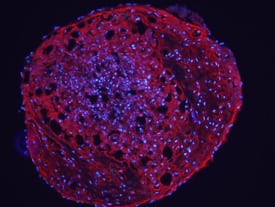Human Aggrecan G1-IGD-G2 Domains Antibody
R&D Systems, part of Bio-Techne | Catalog # AF1220

Key Product Details
Species Reactivity
Validated:
Cited:
Applications
Validated:
Cited:
Label
Antibody Source
Product Specifications
Immunogen
Val20-Arg675
Accession # NP_037359
Specificity
Clonality
Host
Isotype
Scientific Data Images for Human Aggrecan G1-IGD-G2 Domains Antibody
Aggrecan in Rat Mesenchymal Stem Cells.
Aggrecan was detected in immersion fixed rat mesenchymal stem cells differentiated to chondrocytes using Goat Anti-Human Aggrecan G1-IGD-G2 Domains Antigen Affinity-purified Polyclonal Antibody (Catalog # AF1220) at 10 µg/mL for 3 hours at room temperature. Cells were stained using the NorthernLights™ 557-conju-gated Anti-Goat IgG Secondary Antibody (red; Catalog # NL001) and counterstained with DAPI (blue). View our protocol for Fluorescent ICC Staining of Cells on Coverslips.Aggrecan in Human Cartilage.
Aggrecan was detected in immersion fixed paraffin-embedded sections of human cartilage using 15 µg/mL Goat Anti-Human Aggrecan G1-IGD-G2 Domains Antigen Affinity-purified Polyclonal Antibody (Catalog # AF1220) overnight at 4 °C. Tissue was stained with the Anti-Goat HRP-DAB Cell & Tissue Staining Kit (brown; Catalog # CTS008) and counterstained with hematoxylin (blue). View our protocol for Chromogenic IHC Staining of Paraffin-embedded Tissue Sections.Detection of Porcine Aggrecan by Immunocytochemistry/ Immunofluorescence
In vitro differentiation capacity of young and old BM-MSCs: (A) Representative micrographs from each experimental group showing morphological change after 21 days of differentiation. (B) Results of adipogenic, osteogenic and chondrogenic differentiation. Representative micrographs showing anti-FABP4, Oil Red O, anti-osteocalcin, Alizarin Red-S and anti-aggrecan staining in cultured BM-MSCs from each experimental group. Image collected and cropped by CiteAb from the following open publication (https://pubmed.ncbi.nlm.nih.gov/21992089), licensed under a CC-BY license. Not internally tested by R&D Systems.Applications for Human Aggrecan G1-IGD-G2 Domains Antibody
Immunocytochemistry
Sample: Immersion fixed rat mesenchymal stem cells differentiated into chondrocytes
Immunohistochemistry
Sample: Immersion fixed paraffin-embedded sections of human cartilage
Western Blot
Sample: Recombinant Human Aggrecan G1-IGD-G2 Domains (Catalog # 1220-PG)
Formulation, Preparation, and Storage
Purification
Reconstitution
Formulation
Shipping
Stability & Storage
- 12 months from date of receipt, -20 to -70 °C as supplied.
- 1 month, 2 to 8 °C under sterile conditions after reconstitution.
- 6 months, -20 to -70 °C under sterile conditions after reconstitution.
Background: Aggrecan
Aggrecan can be cleaved by MMPs and ADAMTSs at the Asn360-Phe361 and Glu392-Ala393 bond in the IGD (residues are numbered based on Accession # NP_037359), respectively (2). Inhibition of ADATMS4 and ADAMTS5 cleavage prevents aggrecan degradation in osteoarthritic cartilage, while mice with aggrecan resistant to MMP cleavage do not accumulate aggrean and develop normally (2, 4). Consisting of the G1, IGD and G2 domains, rhAggrecan can be used as a protein substrate for MMPs and ADAMTSs and in binding assays involving hyaluronan.
References
- Doege. K.J. et al. (1991) J. Biol. Chem. 266:894.
- Malfait, A-M. et al. (2002) J. Biol. Chem. 277:22201.
- Caterson, B. et al. (2000) Matrix Biol. 19:333.
- Little, C.B. et al. (2005) Mol. Cel. Biol. 25:3388.
Alternate Names
Entrez Gene IDs
Gene Symbol
UniProt
Additional Aggrecan Products
Product Documents for Human Aggrecan G1-IGD-G2 Domains Antibody
Product Specific Notices for Human Aggrecan G1-IGD-G2 Domains Antibody
For research use only


